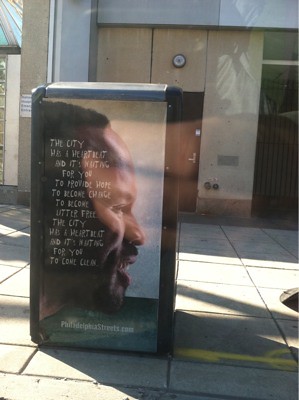
I am neither used to having my attention drawn to trash cans nor regularly inspired by metal containers on street corners. Yet the trash can that appeared to my right when I stopped in front of City Hall today was different. It had a message and a mission.
The cityA rather unusual quote to appear on the side of a container reserved for garbage. Still, the garbage-can poetry resonated with my faith convictions and reminded me of my greatest aspirations: incarnations of hope, movements of change, and a litter-free city.
has a heartbeat
and it's waiting
for you
to provide hope
to become change
to become
litter free.
The city
has a heartbeat
and its waiting
for you
to come clean. [1]
"Then I saw a new heaven and a new earth; for the first heaven and the first earth had passed away, and the sea was no more. And I saw the holy city, the New Jerusalem, coming down out of heaven from God..." (Revelation 21:1-2)It could be said that my morning began with a lesson in garbage-can theology.[2]
Yet, more than the reference from John's apocalypse, Paul's letter to the Philippians came to mind as I snapped this photo:
"For [Christ's] sake I have suffered the loss of all things, and I regard them as rubbish, in order that I may gain Christ and and be found in him..." (3:8-9).
Rubbish.
Garbage.
Litter.
Skubala. [3]
Crap.
All of Paul's previous credentials, identities, and passions were considered garbage compared to his status as an in-Christ citizen within the colony of heaven. His life's message and mission had been transformed and were now wrapped-up in the person and work of Jesus as Messiah. This Jesus was the one whom he believed incarnated hope, inaugurated change, and proclaimed a litter-free city already here and yet-to-come.
Paul followed this Messiah.
The people of Philippi lived into the message of this Jesus.
Christians throughout history have proclaimed the garbage, litter, and skubala of this world, even refuse within churches, redeemed and made new in light of the resurrection of Christ.
Philippians is saturated with images and illustrations intended to form and send God's people into the world. Christ hymn's, tongue-in-cheek statements, subversive phrases, and off-color metaphors litter the letter.
Then I recall the garbage-can poetry I read this morning: provide hope, become change, come clean.
This sounds like a rallying anthem and confessional chant that would fit well within our ecclesial liturgies. It sounds like it belongs in the Philippians Book of Common Worship.
But it came from the side of a trash can.
It was printed on a container filled with skubala.
Notes:
[1]This poem was written by Gregory Corbin as a part of the "Unlitter Us" Campaign: http://www.youtube.com/watch?v=8WghNj4qtzs&feature=youtube_gdata_player
[2] One of my earliest potential blog titles was "Trash Heap Dialogue," inspired by Gustavo Gutierrez' interpretation of Job 2:8: http://gregklimovitz.blogspot.com/2010/06/whats-in-name-beginnings-of-my-blog.html
[3] I have vowed never to "litter" my sermons or writings with references to the Greek. Yet this one is too good to pass up. σκύβαλα refers to refuse, garbage, or dung. However, I think the urban dictionary says it best ;)
- Posted using BlogPress from my iPad
